INK BRICK is an anthology of comics poetry
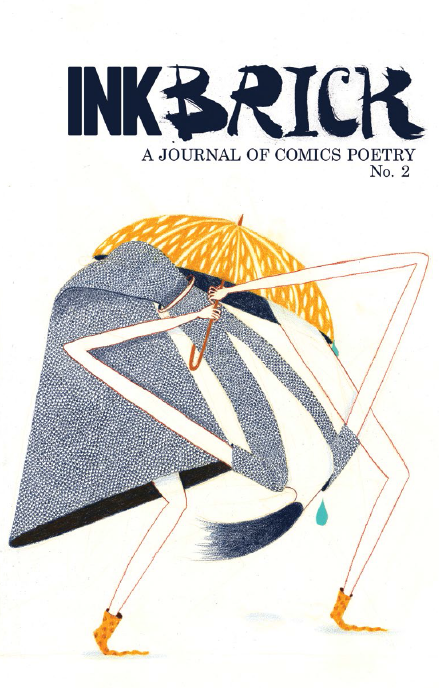 DANIEL ELKIN: The English poet Percy Bysshe Shelley defined poetry as “a mirror which makes beautiful that which is distorted.” Later, T. S. Eliot said of the genre, “Poetry is not a turning loose of emotion, but an escape from emotion; it is not the expression of personality, but an escape from personality. But, of course, only those who have personality and emotions know what it means to want to escape from
DANIEL ELKIN: The English poet Percy Bysshe Shelley defined poetry as “a mirror which makes beautiful that which is distorted.” Later, T. S. Eliot said of the genre, “Poetry is not a turning loose of emotion, but an escape from emotion; it is not the expression of personality, but an escape from personality. But, of course, only those who have personality and emotions know what it means to want to escape fromthese things.”
Thinking this through, this may say more about Eliot than it does about poetry.
Anyway…
My favorite definition of poetry comes from Carl Sandburg who said, “Poetry is a plan for a slit in the face of a bronze fountain goat and the path of fresh drinking water.” That Sandburg was my kind of fella.
Regardless of the definition you prefer, one thing for sure is that poetry ain’t comics. But comics… well they can be poetry?
“Comics Poetry” is a term that has only recently entered my lexicon. Here, individually, are two words that hold special meaning to my heart, but usually they dance on opposite sides of the room in my head-disco, listening to their own particular versions of Love to Love You, Baby. By combining them into one entity, the juxtaposition of the two words is jarring. Comics, after all, are dependent on narrative, while poetry is often of the moment. It threw me a bit to think of how the two media might intersect.
Now here, standing in the midde of that intersection is INK BRICK, wearing a duct-tape coat and holding a tattered cardboard sign which may have once read “Will Yea To Your Beauty”. INK BRICK is a journal of comics poetry that is “dedicated to finding and promoting work that crosses the borders between comics and poetry – material that is either in direct conversation with traditional poetry, or that is forging a new, visual poetics.”
Goodness me, that sounds like a vaguely grandiose and unfortunately dirge-like statement of artistic intent bombast, doesn’t it? Hackles up, one could see how easily “Comics Poetry” could suffer much of the same abuse that “Performance Art” does, by both practitioner and critic.
Picture, if you will, a throng punctuated with endless beards, the sudden shine-flickers off the lenses of cat-eye glasses, and so many fine shoes snapping wildly from panel to panel as the pages turn to the beat of an extended Art Blakey drum solo. Envision swirls of colors placed JUST SO as to implore that you feel that feel that I feel when I use these colors, man, while thick set type-faces shout out “Gossamer” and “Flux” and “Ash-pits” and “Oxides” as if you should know, as if you don’t know.
This is my “Comics Poetry” nightmare, the deviantart.com of the “latest thing” to flop out of some zipped up culture whore, pander-handed and snide-sneered from that plastic ledge of discernment — where art turns fashion turns quickly into a new app for your I-Phone 7 and then is cast aside the moment something new and shiny is shat.
Nightmares fester deep into the night. But, as always, there is a pinprick of light in that darkness. That light is INK BRICK.
Thankfully, there’s a true sense of careful curatorship in the pages of INK BRICK. The Editorial cadre of Alexander Rothman, Paul K. Tunis, Alexey Sokolin, Bianca Stone, and Gary Sullivan have dug the necessary trenches and built the solid battlements in what is assuradly a war against the thick frivolous good intent/bad execution that must constantly be seiging the Comics Poetry crowd. INK BRICK works because of this stewardship and the journal sits comfortably on the table. It is a journal that is as solid a collection of transformative art as there can be.
KEITH SILVA: Mighty fine invocatin’, Elkin, mighty fine. Your muse? That girl? She sings.
As word combinations go, ”comics poetry,” acts like a patellar ligament when met by reflex hammer; the reaction is natural, immediate and axiomatic: Owww!
Dig the reflexive.
Yes, its name alone, INK BRICK, dares the reader reckon with the absurd and the incongruous. So what? These are only words – ”comics” and ”poetry” – and this is only art. Play on. Play on.
If art has a periodic table, comics would be its hydrogen and INK BRICK provides the proof. The there in poetry, all those ”beautiful distortions,” ”emotional escapes,” and ”slits in a bronze fountain goat,” rests in essence, that soupçon of what it means to mean. Comics adapts. The elemental and the magical in comics comes from its fundamental fellowship, a quality of loaminess so fecund anything (everything) grows, to wit, INK BRICK.
Take Alexandra Beguez’s ”He Who Is Upon His Mountain.” How much more of a visual does one need? More, shouts Beguez! So much more. The sticky joy of metaphor and metaphorical originates in its ductile-ness, its power to transmute as it flits from one imagination to the next. How adaptable. How comic.

Beguez’s poem of rebirth, when placed within the context of a comic, looks up from its navel-gazing and the inherent solitude of its titular man (and mountain) and says there’s (always) another, an internal interlocutor, what she calls, ”My insouciant guide,” sometimes there’s a man, a hero, the bearer of the fire, a spirit of action ”unmoved by the firmament,” one who is here to work, to bring about that ”something new” which Elkin mentions. Is the answer Jesus or perhaps comics poetry?
Odd that in a poem of rebirth — such a seminal act – Beguez’s words alone conjure no cocks, no balls neither. And yet there they are, spirit guide and narrator alike, cocks out. Sometimes there’s a man. And yes, I know ”it takes two to make a thing go right.” And no, I don’t know where the women at. This is poetry so … greater forces, probably a woman, are at work to be sure.

“Lady Humpadori” finds Vidhu Aggarwal and Bishakh Som as they sing the body electric. Here comes the girl. Like all bodies (and all work) Aggarwal grows impatient with this particular body’s progress. She questions if the body she describes as ”a jumbo longue in runaway rubber suit, a run-a-way bladder on wheels,” is worth the trouble. Who among us will cast the first stone? From these words Som conjures a zaftig beauty beset by wires, tendrils and tubes, a woman in search of answers (some easy, others complex) and solace from within and without. ”Make me delicate,” she says as she dives deep deep in a deep space ”blood fold” and ”chin deep” in complications and ”lipids,” a celebration of ”deep down things.” Yes and I said Yes. Isn’t all poetry about fucking and loneliness? Mostly fucking?
Yea say this INK BRICK, this comics and this poetry. Adapt! Adapt! ADAPT!
DAVID FAIRBANKS: Daniel, while you contend that poetry ”ain’t comics,” I would suggest you take a fresh look at Scott McCloud’s over-referenced-but-no-less-seminal Understanding Comics. The skritches and scratches that we recognize as letters are inherently no different than the ones we recognize as drawings, their places in a stanza or line no less important than a panel’s placement on the page. After all, all it takes is a circle and two lines for us to “see” a face, and are letters any less a constructed thing?

While folks may be less inclined to look at poetry as comics, there’s no reason that stanza/line arrangements and sizes couldn’t tell their own story as well. Indeed, a short and fat stanza followed by a long a thin one can give you a context or a feeling for a poem that two uniform stanzas wouldn’t give, and it would affect the way a poem is read. It’s certainly easier for comics to be poetic, but poetry can be… comical? Let’s say “comic-like.” And take advantage of presentation on the page in many ways that comics do.
While this is my first foray into INK BRICK territory, I have stumbled on other attempts at mashing up my two favorite mediums. I first discovered Paul K. Tunis in a collection titled Comics as Poetry, and it was interesting to see his work again in INK BRICK, though the rest of the contributors are new to me. Though I am seduced by the possibilities of comics as poetry as comics or poetry as comics as poetry as well as what it means to the critic in me to look at gutters and line breaks on similar terms, I have to wonder if the desire to label these as “comics poetry” isn’t simply an attempt at some kind of critical clout that would not come as easily if INK BRICK were branded with what I feel is the more fitting “art comics” label.
For instance, I found myself enjoying “He Who is Upon His Mountain,” but it also felt like Beguez was reaching for her thesaurus for “insouciant” and possibly trying to make her text sound poetic by pairing it up with “firmament,” not unlike how comics writers who wish for their work to be regarded as a “graphic novel” frequently sound like they’re aping capital-L Literature. Then there are Heather Simon’s untitled pieces, which strike me as surreal at best and nonsensical parading as surreal at worst. They are interesting as bits of collage art, but they weren’t really able to win me over as poetry or as comics.
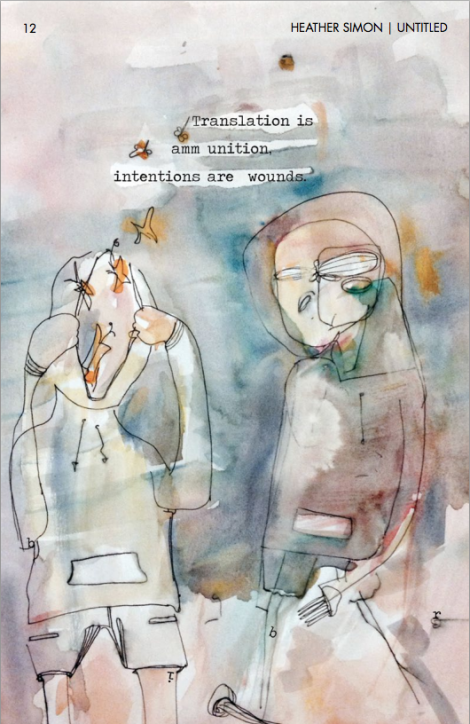 Most of these comics feel like they are much more comic than poem, with exceptions for the above-mentioned Simon’s contributions as well as Jesse Reklaw’s “Steps” and Alexey Sokolin & Angel Chen’s “Given the Choice,” which both read more like poems than comics. Indeed, the only thing they seem to take from the cartoonist’s toolbox is the use of panel borders to sort their stanzas. It’s a neat trick, and I adore the layering going on in “Steps,” but I can’t really tell what the point is of the frantic colors, scribbling, and occasionally typeset words. I do think that it would be difficult to recreate the reading experience of “Steps” in a more traditionally structured poem, but that has everything to do with the 9×9 panel grid and nothing whatsoever to do with the choices of art or color.
Most of these comics feel like they are much more comic than poem, with exceptions for the above-mentioned Simon’s contributions as well as Jesse Reklaw’s “Steps” and Alexey Sokolin & Angel Chen’s “Given the Choice,” which both read more like poems than comics. Indeed, the only thing they seem to take from the cartoonist’s toolbox is the use of panel borders to sort their stanzas. It’s a neat trick, and I adore the layering going on in “Steps,” but I can’t really tell what the point is of the frantic colors, scribbling, and occasionally typeset words. I do think that it would be difficult to recreate the reading experience of “Steps” in a more traditionally structured poem, but that has everything to do with the 9×9 panel grid and nothing whatsoever to do with the choices of art or color.
“Given the Choice” seems to suffer from a similar fate, though I do appreciate that the team answers the first panel’s “What is Shangri-La to you?” with a textless panel of a cityscape. It feels like a good use of cartoonist skills, but it also feels like the only time the comic poem was particularly comic-like. While “Steps” did something really interesting and layered with the text despite not really engaging the art, “Given the Choice” engages the art just a bit but then retreats back into the world of poetry, not unlike making a mashup of sepia-toned images with lyrics from your favorite band.
And I could go on about the other end of the spectrum, the comics poems that are more comic than poem, but I don’t want to make it seem like there’s anything wrong with the contributions toINK BRICK. Aside from a few pages, I found myself enjoying the bulk of the journal. But I am curious about how we define comics and poetry and just where in the overlap of that Venn diagramINK BRICK resides.
ELKIN: Ah, Fairbanks. You and your ”art comics” and Venn diagrams. Be careful, you teeter on the edge of being mistaken for a Millennial Literalist. (ed. note: If you’re unfamiliar with the term “Millennial Literalist,” that’s okay. It’s a phrase that a guy at The Comics Journal used to yell at kids trampling his lawn. We’re not linking to it. You can find it yourself.)
Still…
Correct me if I’m wrong, but you seem to be cribbing, caging, and confining what you have before you in INK BRICK using old familiar terms – if this is true, I understand the compunction. We are, after all, saddled with the burden of needing to make sense of the world before us and unfortunately our sense making mechanism functions on the fuel of our prior knowledge. Maybe this comics poetry thing is the infancy of some new understanding of the world and it requires new neural connections to understand, new muscles to flex, new eyes to see. What has gone before bears little consequence other than as a springboard into uncontaminated thought. Silva’s call, “Adapt! Adapt!” echoes in my apperception.
And yet it seems to me that both of you, so far in your criticism, are still working within traditional ideas of both comics and poetry. Silva talks of narrative, Fairbanks talks of 9 x 9 panel grids. We need new language to grok this stuff. In the face of something truly original, the word stock in our cupboards is sparse and covered with silvery webs and the occasional rodent turd.
Still…
I draw your attention to Alexander Rothman’s “How To.” With this piece, I could easily wear comfortable shoes and talk about the construction of the presentation, how Rothman’s panels function much like a traditional poem’s line breaks. I could say that what lies in the gutters of this comic is our breath, a pause in our reading, a cadence to sound the poet wants us to hear. I could feel good about this kind of footwear; I could probably walk for miles. But let me put on my glossy red leather 10-inch stilettos to run this marathon instead. Instead of breaking it down to talk about comics and then poetry, let me instead speak of “How To” as comics poetry.
In comics, words and pictures work in harmony to create story. In poetry, words are arranged to create emotional imagery. In Rothman’s piece images and words are in conversation with each other instead of the reader. What is on the page undulates with its own exchange as pictures and terms work out their issues in front of us. The resonance of their intercourse in different voices creates the song of the work. As just a poem or as just a comic it would not be as sweet. “How To” is a “how-to” on experiencing comics poetry. You don’t read it. You don’t stare at it. You listen.
See what I’m saying? It’s hard to express. Right now there just aren’t the words I need. This is the best I can do. Perhaps I need “comics criticism” to comment on “comics poetry.” I’m getting too old for this shit.
Still…
Fairbanks, you mention Paul K. Tunis and I think his contribution “Paper Mice” is as solid a piece of comics poetry as Rothman’s. Here, Tunis certainly has a poem. As well, he certainly has a comic. But “Paper Mice” is neither. Once again, when he allows the conversation to occur, he creates comics poetry. This is not words and pictures working in harmony. This is an argument or a debate and this interaction creates something new that would have never existed had Tunis curled into the comfort of defining himself just as a poet or just as a cartoonist. He makes comics poetry, it is us who must adapt.
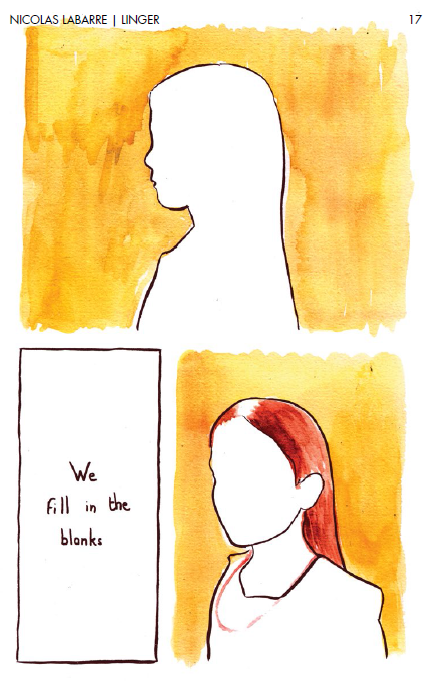
For me, within the pages of INK BRICK No. 2 the comics poetry that shows its true face as an original art form is Nicholas LaBarre’s “Linger.” In “Linger” you cannot separate the comic from the poem, nor can you pull the poem from the comic. The conversation is the art. Each aspect of how LaBarre put this piece together isn’t a matter of playing off expectations or using the conventions of comics and poetry to express an idea. Rather, it forces an experience that shatters us by whispering in some argot we have only just begun to learn. “Linger” lingers more so than any other piece insomuch as it shows what comics poetry is, can be, should be.
What happens when you throw an INK BRICKthrough the window of our comfortable view of the world?
I fear that I am catching a tiger by the tail with my tongue here. That as I try to sing the praises of something amazing, my ability to communicate it stretches out to be vague, dim, elusive. I worry that my description itself shall turn, suddenly, and unsheathe its savage claws. By stumbling through my applause for INK BRICK, I undermine intent.
Still….
SILVA: You two and your personal pronouns. “I.” “I.” “I!” You want to know what I think … fine.
Recently, I went with a friend as the plus one to a late night soiree which among other foodstuffs included dumplings, which the host claimed were the best in the city. Now, as those best-in-the-city-dumplings disappear gullet-ward, the conversation goes round and round and at some point the subject changes to books and writing. I must have said something because my friend points a forkful of dumpling in my direction and says, ”that’s because you’re a Joycean!” I was taken aback, outed in front of strangers, who may know of the great man’s work, but who, of course, could never appreciate it as much as I do. I’ve read Ulysses, dammit and Yes (I say Yes again) I am a Joycean.
When Elkin began dropping Sandburg and Eliot and Shelley, I thought I should do the same. Whip out my long fellow, as it were, and we could size each other up. And then I thought better of it and chose to talk about the work, about sex, about INK BRICK instead, until, of course, now.
ANYWAY, the other day was the anniversary of Joyce’s death and on his Facebook page – let that one sink in for a minute – Vintage and Anchor books posted this bit of Joyceinalia:
”Poetry, even when apparently most fantastic, is always a revolt against artifice, a revolt, in a sense, against actuality. It speaks of what seems fantastic and unreal to those who have lost the simple intuitions which are the test of reality; and, as it is often found at war with its age, so it makes no account of history, which is fabled by the daughters of memory.”
This is the insouciance, the cool, I needed to read in order to write about INK BRICK. This, this, this as the memes go. You two are the poets, I was hired for punch up (see dick jokes) and insider-ish shit like not-so-veiled nods to The Big Lebowski and Slapshot. So here’s my man Joyce, who desperately wanted to be a poet, giving us the esprit de INK BRICK: ”it makes no account of history.” Yup. Go sell your crazy (history) somewhere else, you daughters of memory.
Here is a new thing, Fairbanks. And, by-the-by, your insights and tough love always makes me sound like such a sycophant, that’s praise, my friend, sincerely. I too struggled with what INK BRICK is, at first, but abandoned my anxiety down a back road somewhere because what’s the point? Yes some of INK BRICK – Simon’s Untitled pieces as well as Summer Pierre’s “Year,” which is more illustration than comics – carries a slight insipid tang of undergraduate literary magazine. So what?
INK BRICK and comics poetry, whatever either is, is the best Rube Goldberg device I’ve seen (or read) in some time. When it works as with Labarre, Beguez, Tunis, Aggarwal, and Som it sings in its fantastic and the unreal. For now, let it be that, let it not be easily categorized, an oddball. Let’s watch it as it revolts.
Let’s watch it as it learns.
FAIRBANKS: Yeah, I admit that I started to get sidetracked pretty fast on what they’re trying to do and why they’re choosing to call it “comics poetry,” but I always get a bit apprehensive when someone calls something poetry that isn’t just words and stanzas. That apprehension goes up a few levels when something that’s often viewed as a “low art” gets categorized as poetry in an attempt to legitimize it when it should be treated as legitimate in its own right (ask me sometime about how I can love hip-hop, love spoken word, love poetry, and insist that hip-hop is not poetry).
While I did spend more time than I would have liked going “this feels more like comics than poetry” and “that feels more like poetry than comics” and “what is INK BRICK trying to accomplish by calling themselves comics poetry,” by and large I liked the comics here. And Daniel, “Linger” definitely struck me as the most comical poetry or poetic comic or whatever we want to call this weird thing, and maybe that makes it a good metric for comics poetry? The idea that it can’t really exist or tell the same story (or perhaps any story) without the fusion of comics and poetry feels like an essential quality, and it also struck me as one of the most emotionally moving despite how vague so much of it is. It felt simultaneously light—both in color and depth—while also feeling quite heavy.
I’m curious to read more of INK BRICK, and hope it continues to publish strange, interesting, and moving comics whether or not the name/genre makes sense to me.
ELKIN: Though we cannot agree on the language for our praises, it appears we are all in agreement that Comics Poetry is a thing, for the most part INK BRICK seems to understand what that thing is, and that the editorial control of the journal allows us access to some of the best work out there, uncluttered by what I termed earlier my “Comics Poetry Nightmare.”
At the high school where I teach, I have the pleasure of leading both a poetry workshop class and a comics workshop class. Maybe next year in order to save time and effort, I’ll teach a Comics Poetry class. Just thinking out loud here…
Anyway, as way of wrap up, in a 2004 interview with Mark Tursi, the late prose-poet Russell Edson is quoted as having said, “poetry is a thing of gesture and sign, and almost a nonlanguage art … words are the enemy of poetry. Poetry joined to conscious language is a miraculous contradiction… Poetry is a way of mind; the exploration of a tunnel, where blind albino fish seem to float in nostalgic pools of unremembered memory.”
Based on this, somehow I think Edson would have been happy with what he would have experienced had he stayed alive long enough to flip through the pages of INK BRICK.
You can buy INK BRICK in print and digitally at INKBRICK.com.
KEITH SILVA reads novels with swear words, blogs about comic books, and watches unwatchable movies. Silva updates his blog, Interested in Sophisticated Fun, with a frequency yet to be determined and can be found tweeting at @KeithPMSilva.
DAVID FAIRBANKS is Loser City’s resident poet and Creative Writing Editor. He doesn’t get many things right the first time but insists that this is why editors exist and why the English language features the prefix “re-.” You can find David twittering with alarming frequency at@bairfanx.

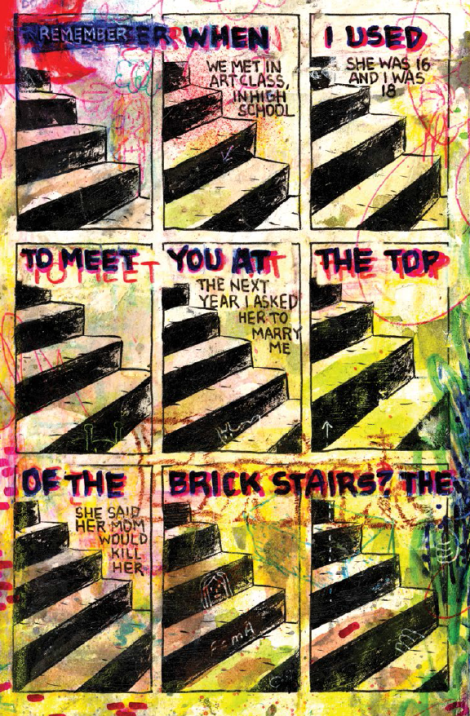
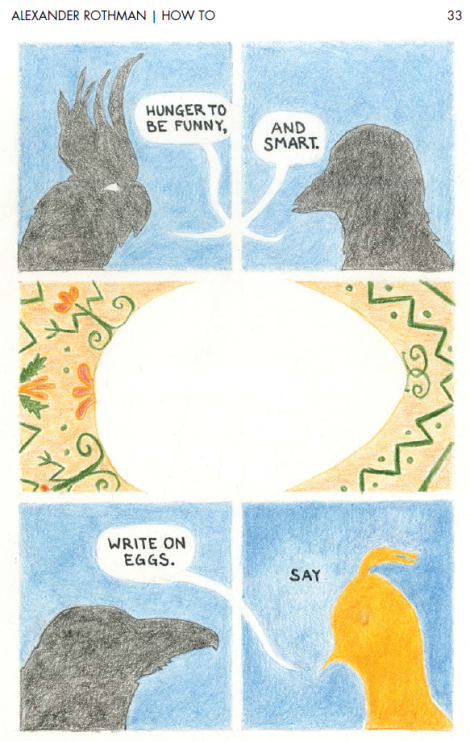

No comments:
Post a Comment